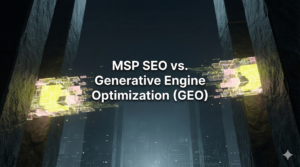It might sound like something straight out of a sci-fi movie, but you can build your own SEO team of AI agents today without any experience in coding. That’s right, we’re truly living in times where something of this sort is not unthinkable.
The fear of whether AI will replace us has largely subsided and has been replaced with the fascination and amazement of how we really got anything done on time without it.
AI has made the extremely time-consuming task of content creation and SEO something that can be done within minutes, without a loss in quality and with possibly better accuracy at that.
Let’s discuss more about how you can build your own team of SEO AI agents and automate the entire SEO process.
What are SEO AI Agents
Consider SEO AI agents to be your personal “digital SEO team.” They handle all the work related to SEO, which includes but isn’t limited to finding relevant keywords, writing content, optimizing pages, creating reports, and reaching out for backlinks. They are a means to automate these tasks without ever getting tired and needing breaks. And they always hit deadlines.

AI is by no means killing SEO, but it is evolving it to the point that those unwilling to grow would find the SEO space unrecognizable. In fact, according to SEOProfy, 86% of SEO pros already use AI in their workflow, so if you’re not, you’re falling behind. AI has put on the boosters for every aspect of SEO.
Imagine trying to compete in a MotoGP on a retro motorcycle. Sure, you might get some points for style and staying old-school, but it won’t win you any trophies.
AI vs Traditional SEO Teams: A Quick Comparison
Let’s compare AI SEO agents with something we’re all, at least to an extent, familiar with: a traditional SEO team.
A traditional SEO comprises writers, researchers, analysts, and people who do outreach for link-building. Their salaries, potential insurances, management, raises, bonuses, holidays, birthdays – all of that comes out of your pocket. And that cost? It adds up over time.
Moreover, they’re likely only working from 9 to 5, any overtime is paid, and let’s not forget the mandatory breaks.
On the other hand, we have our AI SEO agents that have the potential to work 24/7, no weekends required. They can handle a ton of work all at once and cost way less compared to paying a team of humans. There are also no disagreements or issues. What you tell them is what they do, no questions asked.
The output that the AI team generates is simply unmatched. They do the same quality of work, sometimes even better. They get said work done faster, cheaper, and you’ve got the control to scale it up anytime you want.
How to Build Your AI-Powered SEO Team (Step by Step)
Alright, let’s get to the part we’ve all been waiting for. We’ve sold the idea of an AI SEO team, but how do you get one? Well, you must build it. And here is a step-by-step guide on how to go about it:
Step 1: Automate Keyword Searches
Keywords are the foundation of SEO, and all SEO efforts begin with keyword research. However, the process of manually searching for keywords every so often is tiresome.
What you can do instead is automate the entire process using Make.com. It is an automation tool that requires no code and runs keyword checks every week or month. You would, of course, need to sign up first and create a workflow.

From there, connect it to tools like Ahrefs or SEMrush using their APIs. These tools will automatically find relevant keywords, which OpenAI’s API can then sort out. This will keep the ones with high search volume but low competition and sideline the others.
Store the final list in Google Sheets if you want to keep it simple, or use something cleaner like Notion or Airtable if you like a more organized workspace, totally up to you. Finally, set up alerts. You can have the system ping you on Slack or email whenever a juicy new keyword shows up. Even when you’re inactive, your AI agent is actively hunting for better-performing keywords.
Step 2: Build a Content Writing AI Agent
The backbone of SEO is content… but just not any content. Only that which can be deemed relevant, helpful, well-structured, optimized, and updated. That is a lot of work for a human writer, and naturally, it would take them plenty of time.
However, AI is a content machine that can pump out content 24×7. The content would need to be adjusted to your brand’s voice and tone, and not be “too robotic,” but it can easily be achieved. Here’s how you do it:
- Use ChatGPT for the first draft. Use it to generate your blog outlines and full drafts. Just give it a topic or keyword, and boom, structure, intro, headings, and all.
- Run the draft through Claude AI. Why? Because Claude is great at making the tone sound more natural and human.
- Toss the draft into Surfer SEO for the optimization of keywords, structure, and word count. This is optional but recommended.
- Automate publishing using Make.com or Zapier to send that finished blog straight to WordPress or any CMS of your choice.
You can make use of existing voice templates or train the AI yourself. The more you train it, the more unique your content appears to be. The more information an AI is fed, the better it gets. The entire process from creation to publishing is automated, freeing up a load of time for you to focus on growth strategies.
Step 3: On-Page SEO AI Agent
As mentioned before, just pumping out content isn’t enough. Google needs to like it, too. That’s where AI agent number 3, our on-page SEO AI agent, comes into the picture. This agent’s job is to make sure your content is not just good but optimized for Google.
The on-page SEO agent will make use of NeuronWriter, Surfer SEO, or Clearscope in order to tweak the content for maximum SEO performance. They guide you on areas like keyword density, headings, and readability.
From there, ChatGPT API comes into play to fill in the little details like meta descriptions, alt image text, and internal links. It may seem like a small thing, but it greatly impacts your rankings. It will automatically generate them.
Now, it is time for some beautification. Visuals matter a lot, as they define many brands. You want visuals that represent your brand’s image and do so consistently. You will use DALLE 3 (now available within ChatGPT) to create visuals that fit the branded style guide you provide.

You can also use the pre-established design styles if they match your preferred aesthetic. Automate this entire process by setting up a workflow on Make.com and connecting DALLE 3 with your current content management system.
And voila! Once the content and visuals are ready, your content can go live without any manual intervention.
Step 4: Link-Building AI Agent
Ranking high on the SERPs from the get-go is tough, and frankly, very unlikely. After all, establishing credibility in the eyes of the algorithm overlords isn’t particularly the easiest thing to do.
However, just like in real life, having the right contacts can be of great help. In SEO terms, those are backlinks. When other high-ranking websites link to you, it shows Google that you, too, are trustworthy.
It isn’t easy to get those links. You must find websites related to your niche and then reach out to the owners of these websites. This takes time. However, just to hammer the point home once more, AI takes the effort away.
Using tools like BuzzStream and Pitchbox, you can identify high-authority websites. This includes, but isn’t limited to, blogs in your niche, media sites, partners, and others. The goal is to spot places that would realistically link to your content.
Moreover, with the help of Apollo, you can obtain the contact details of the decision makers. ChatGPT then drafts an email to send.
Finally, and here is where you save the majority of the time. You can use Make.com to automate follow-ups. Decision makers are busy, so they don’t often respond to the first email. However, here, you have a system that automatically sends a polite reminder.
Step 5: Technical SEO AI Agent
An often overlooked but critical part of having a website that actually ranks well is technical SEO. Without getting too technical, no pun intended, technical SEO is all about building a website that is fast to load, mobile optimized, safe (HTTPS), properly indexed, and easy to read. Google loves websites like these. AI takes care of all that.
You can use tools like Screaming Frog or Sitebulb to audit your website automatically. It finds issues like broken links, missing tags, duplicate pages, and everything else that quietly wrecks your rankings.
Then, it keeps track of how fast your site loads by pairing with the Google PageSpeed API. When it notices any unoptimized pages, it flags them, whether due to bad indexing, poor code, or bloated images.
In addition, you can use Make.com again and connect it to your Google Search Console to stay on top of the alerts via email or Slack so that you can react fast.
Step 6: SEO Reporting AI Agent
Alright, let’s get the final recruit for our robot army. It’s a strong reporting AI agent, and its job? Turning all data into clean, simple updates you can actually use.

Start with Google Looker Studio (formerly Data Studio), which allows you to create live dashboards for easy viewing of vital information, including, but not limited to, keyword rankings, traffic, conversions, the whole shebang. You can, from there, link it to all your data sources, like Google Analytics, Search Console, and more.
Next, use SE Ranking, which allows you to see which keywords are performing and which are not. This is crucial because you don’t want any wasted efforts. Get rid of what is not working and double down on what is.
As has been the case so far, plug all of that into Make.com to automatically generate reports. Use AI to write performance summaries in plain English. Just “here is what happened, and here is what to do next.”
All the generated reports are sent to you via email or Slack. You don’t even need to open Looker Studio unless you want to dive deeper.
Cost Breakdown: What You Save With AI SEO Agents
Making use of AI SEO agents can save you plenty of resources, the most important of which are time and money. Money is a big one, as it can be invested elsewhere to fuel further growth.
Generally, a full team of experts would cost you anywhere from $10,000 to $20,000 every single month. That is far from a small number, especially if you’re a small-scale business or a startup. This is also primarily the reason why it’s mostly the giants that rank higher on SERPs.
Not anymore. With AI tools, you can get similar results to what you would with a human team of experts at a fraction of the cost; we’re talking $100 to $500 a month. That’s around the amount your SEO department would have spent on an equivalent amount of coffee. Plus, let’s not forget the effort it takes actually to manage a team. No need to worry about burnout, delays, or trying to keep everyone on the same page.
To back things up further, this isn’t merely hype. These tools have been shown to be effective. As reported by SEO.AI, around 40% of new-age marketers have observed a 6 to 10 percent increase in revenue after they started using AI. So, not only does it result in savings, but it actually has a positive impact on your income.
The Future of SEO is AI-Powered
The trends have turned into everyday practice. The hype is gone, but the product? It has stayed. AI has clearly stood the test of time by now, and in 2025, it is solidified that AI is the future because it’s:
- Smarter
- Faster
- Accurate
- Inexpensive compared to a human resource of equivalent skill level
AI is always improving and learning from new data, which frees you up to focus on the bigger picture. Do not lose hours of your day doing SEO manually. Accept the helping hand of AI to save all the precious resources one needs to grow a business.
Need Help Automating Your SEO with AI?

It can be overwhelming to know where to begin. There are a massive number of tools out there, SEO practices are always evolving, and while AI is mostly no-code, it still requires some knowledge to set everything up. If you’re a new business looking to establish your own AI SEO team, we here at NUOPTIMA can help you with our SEO services.
Following the techniques we mentioned above, we’ll set up an entirely AI-driven ecosystem for your website, which will:
- Research the best keywords for your niche
- Generate high-quality content that actually engages readers and captures the algorithm
- Find any technical SEO faults in your website and alert you about them
- Build smart links that are appropriate to your niche
We’re a digital marketing agency, not from the future, but from now, where AI and human expertise can work hand in hand. It entirely depends on which way you’d want to go. To know more and find out if an AI SEO team is the best course of action for you, book a strategy call with our CEO today.
Closing Thoughts
If you’re still doing SEO the old-school way, you’re at risk of falling behind. With the right AI agents in place, you can automate every part of your SEO workflow without writing a single line of code. Also, with AI agents, you can do the work of 5 people in half the time (and for a fraction of the cost). When it comes to scaling SEO in 2025, your smartest hire might just be AI agents.
FAQ
SEO experts who do not use AI and evolve with time will certainly be replaced, to some degree. AI’s ability to handle repetitive tasks remains unmatched, so if an expert learns to use it, they can free up plenty of time for themselves to strategize and do creative work.
AI content does not hurt SEO, and this is the single biggest myth revolving around AI and SEO. Google, or any search engine, does not care if AI generates content, and AI detection tools are far from perfect to begin with. If the content is useful, high-quality, and relevant, it is all that matters.
Automated SEO uses AI tools to handle tasks like keyword research, content optimization, and backlink building. Everything that is involved within the domain of search engine optimization, performed now by AI, automatically, is automated SEO.
It is indeed legal to use AI-generated content. Make sure the content you create is original and does not violate copyright laws, and you should be good to go. Also, always check for plagiarism.



